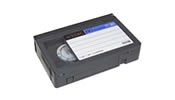VHS-C
VHS-C is the compact VHS format introduced in 1982 and used primarily for consumer-grade compact camcorders. The format is based on the same videotape as is used in VHS, and can be played back in a standard VHS VCR with an adapter. Though quite inexpensive, the format is largely obsolete even as a consumer standard and has been replaced in the marketplace by digital video formats, which have smaller form factors.
The magnetic tape on VHS-C cassettes is wound on one main spool and used a gear wheel which moves the tape forward. It can also be moved by hand. This development hampered the sales of the Betamax system somewhat, because the Betamax cassette geometry prevented a similar development.
VHS-C was one of the pioneering formats of the compact camcorder market, and was released to compete with Video8. VHS-C cassette was larger than Video8 cassette, but was compatible with VHS tape recorders. A higher quality version of VHS-C was released, based on S-VHS, known as S-VHS-C, that competed against Hi8, the higher quality version of Video8. The arrival on the market of inexpensive S-VHS-C camcorders led to the inclusion on many modern VCRs of a feature known as SQPB, or SuperVHS Quasi-PlayBack, but did not make a significant impact on the market as the arrival of MiniDV as a consumer standard made low-cost, digital, near-broadcast-quality video widely available to consumers, and rendered analog camcorders largely obsolete.
Compared with Video8, VHS-C had identical video quality but a shorter run time, 120 versus 40 minutes at SP speed, 240 versus 120 for longer-running modes. Although at one time JVC marketed a 45-minute and a 60-minute SP Mode tape with the Extra High Grade formulation (135 minutes, and 180 minutes in EP/SLP Mode). Hi8 and S-VHS-C both have laserdisc quality pictures, but media is far less readily available than the cameras themselves, and thus most S-VHS-C units support S-VHS ET, which allows recording of an S-VHS signal on high-grade VHS tape.
Although Video8 acquired a digital variant, Digital8, it is extremely unlikely that D-VHS will ever be adapted to a compact format, as the consumer camcorder industry has largely standardized on small-format MiniDV and the new hard drive based recorders. As of 2010, a few VHS-C and S-VHS-C camcorders are still available from JVC at extremely low prices (~US$200), and the media remains widely-available at relatively low cost.
